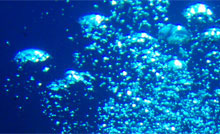The assumption is that any process can be simulated with mathematical equations, which can be implemented in a computing code. A model is a simplification of the reality. A model would never be able to replicate the exact behaviour of an ecosystem, for practical reasons (too many equations needed, too much computational time or disk space required) and theoretical reasons (instability, uncertainties).
Q. How is it different from other scientific methods used to study CO2 effects on the ocean?
A. It is the most powerful method that can be used to make forecasts about the future state of the ocean ecosystem.
Experimental approaches are of course absolutely necessary, but they usually focus on a limited number of factors, species and on a limited space. Marine ecosystem models are able to integrate the results of several experiments and to make measurements on a wider scale.
Q. Certain areas of the globe- high latitude oceans, coral reefs, benthic communities- are very much threatened by ocean acidification. How bad could they be affected in the short run, and in the long run?
A. The impacts are not completely clear and understood, due to the relatively recent interest in ocean acidification. Several aspects have been investigated already, and plausible impacts have been demonstrated: changes in speciation of several chemical compounds, changes in productivity rate, in behaviour of animals.
Long-term impacts should be much more serious, especially when the undersaturation of aragonite (calcium carbonate) occurs. But some changes are already happening.
As for how it will affect the whole ecosystem, that is hard to say. Many factors are at play, so it is hard to predict. Generally, you can expect a loss of biodiversity, a change in the throphic web structure, and a change in the global carbon cycle.
Q. Have you used models that combine information on both the rise of temperatures and the rise of CO2 in the ocean?
A. The model I'm using is able to do this, and this is one of the aim of the European Union projects I'm involved in: EPOCA, which focuses on ocean acidification, and MEECE, which takes into account multiple drivers. It is crucial to study both temperature and CO2 processes simultaneously, because of their strict interaction.
Q. It seems that ocean acidification would be bad news. May it also bring good news for human beings or marine species?
A. It is possible that, for some single species or in specific areas, ocean acidification will be beneficial. But it is not at that scale that an environmental issue should be evaluated.
Q. Have you studied how effective certain solutions to mitigate ocean acidification could be? For example, have you tried to evaluate the potential of iron fertilization, or James Lovelock's idea of ocean pipes bringing nurients up to the surface?
A. I haven't studied ocean acidification mitigation. As stated in the Monaco Declaration, there is no geo-engineering remediation of ocean acidification. The solutions you mention have been suggested to reduce CO2 in the atmosphere, but the result is an increase of CO2 in the ocean, and even more acidification.
Q. What are you working on right now ?
A. I'm trying to improve the marine ecosytem model we use at the Plymouth Marine Lab, to simulate the impact of ocean acidification on the Northwest European shelf- an area that goes from northern Spain to Iceland and Danemark. With this model we will be able to produce scenarios on pH, air-sea fluxes of CO2, primary productivity changes, and speciation of nutrients.
|



